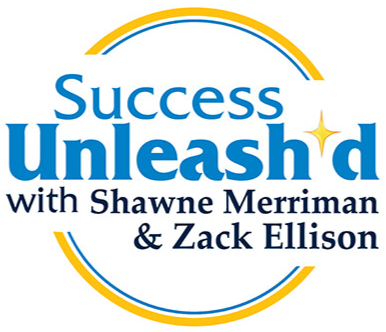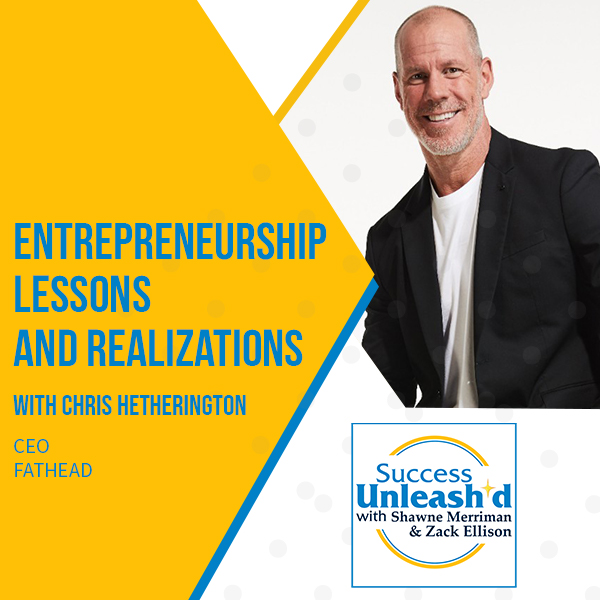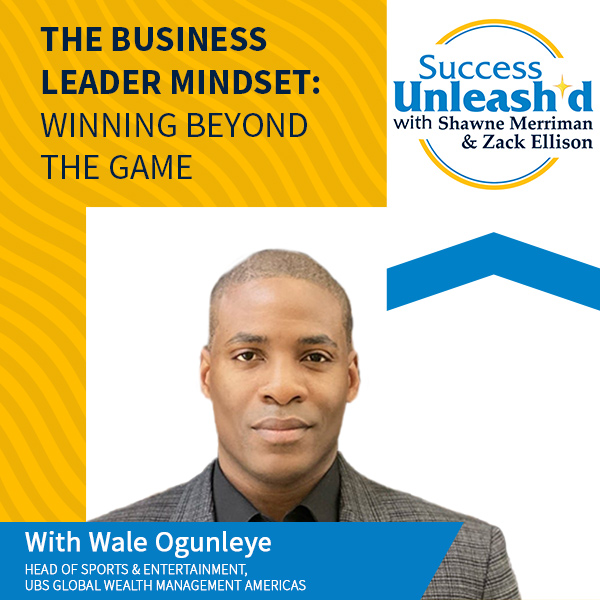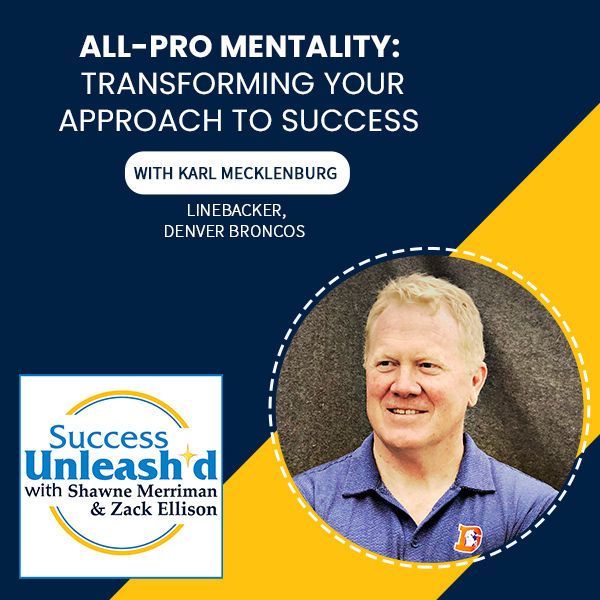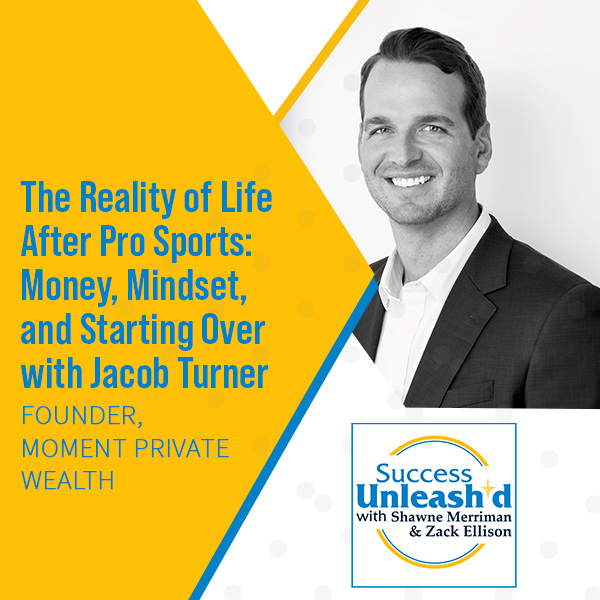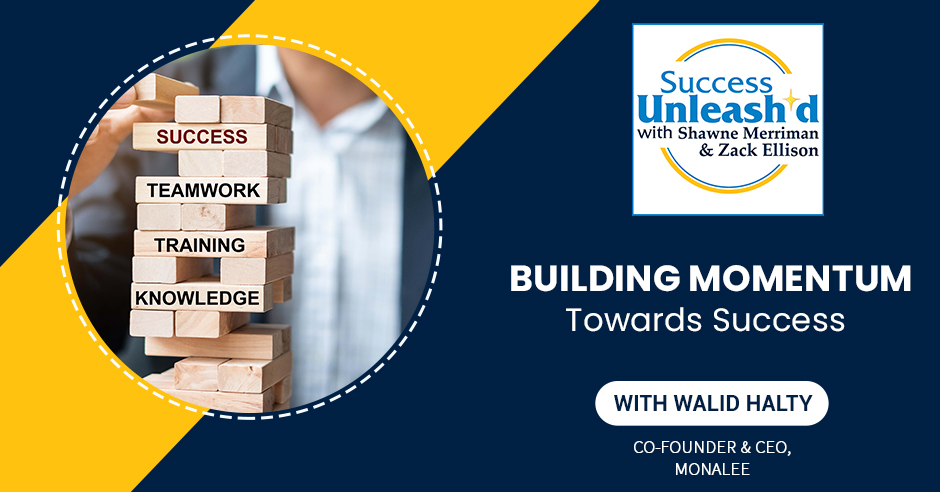
In this episode of Success Unleash’d, Zack Ellison and Shawne Merriman sit down with Walid Halty, co-founder and CEO of Monalee, to discuss how momentum and relentless execution drive long-term success. Walid shares his journey from door-to-door sales to leading a cutting-edge AI-driven solar company, emphasizing that overnight success is the result of years of effort, learning, and resilience. He also dives into lessons on leadership, confidence, managing ego, and the power of lifelong learning. Whether you’re an entrepreneur, investor, or just looking to level up, this episode delivers invaluable insights.
Success Unleash’d Principles From This Episode
1. Success is Built on Years of Hard Work, Not Overnight Wins
Walid stresses that “it takes ten years to be an overnight success.” Behind every rapid-growth startup or career breakthrough are years of learning, failing, and refining skills. The key is to stay the course, build on past experiences, and keep pushing forward.
2. Show Up – 80% of Success is Just Being There
Walid’s best advice? “Just show up.” Opportunities, relationships, and momentum are built by consistently showing up, even when you don’t feel like it. Whether it’s a workout, a business meeting, or a difficult conversation, being present is half the battle.
3. Get Comfortable with Rejection
Starting in door-to-door sales, Walid learned that handling rejection is the ultimate entrepreneurial skill. Developing thick skin allows you to keep going despite setbacks, a key ingredient for success in any high-stakes environment.
4. Execute Relentlessly – Don’t Just Plan, Take Action
Procrastination kills progress. Walid, Shawne, and Zack all emphasize the importance of efficiency and execution. Success comes from taking action daily, even when you don’t have all the answers. Learning through doing is far more effective than endless planning.
5. Momentum is Your Greatest Asset
In startups, sports, and life, momentum compounds results. Walid views his role as CEO as “the momentum builder and momentum keeper.” When things are going well, double down, press forward, and capitalize on the energy.
6. Partner with the Right People
Early on, Walid learned the hard way that working with the wrong partners leads to disaster. Now, he prioritizes character, work ethic, and alignment over flashy resumes. As Shawne put it, “Give me the 4th-rounder who works his ass off over the 1st-rounder who coasts on talent.”
7. Lifelong Learning is a Superpower
Walid embodies the student mindset, constantly improving in areas outside his expertise. He even took accounting and computer science courses to understand his company better. His advice? “Stay curious, keep learning, and never assume you know it all.”
8. Confidence Comes from Competence
Walid admits he lacked confidence early on. But over time, he realized that true confidence is built through action and mastery rather than arrogance. His lesson: work on yourself, develop skills, and confidence will naturally follow.
9. Success Requires Relentless Adaptation
Walid’s journey involved multiple failed ventures before Monalee took off. His ability to pivot, learn, and iterate after failures has been critical. Success isn’t about getting everything right the first time, it’s about adjusting until you do.
10. Meditation and Mental Resilience Give You an Edge
While most entrepreneurs focus on grinding, Walid found meditation to be a game-changer. It helps him think clearer, anticipate challenges, and stay focused. His advice? Slow down to speed up because mental discipline is just as important as hustle.
—
Watch the Episode Here
Listen to the Podcast Here
Building Momentum Towards Success With Monalee Founder Walid Halty
Welcome to another episode of Success Unleash’d. We have with us Walid Halty, one of the leading startup founders in America right now. Walid, thanks for joining us. I would love to hear what you are doing with your company and how you’ve become so successful.
Thanks for having me. We are a software company using vertical AI and machine learning to automate and improve a lot of the process. A lot of stuff that happens offline requires a bunch of people for solar storage and EV charging. We built a bunch of software to make it faster, easier, and better for consumers and installers. We are doing so well, but as I like to say, it takes ten years to be an overnight success. We started this business two years ago, but we have been on this journey for all of the previous ventures and businesses, especially the failed ones. Each one of them has stacked on and given us the learnings to be able to do as well as we are doing with this new business. That speaks to all my co-founders and team members, not just me.
It’s funny you say that because I say that all the time. People never see us in practice. They don’t see the repetition of these drills, whether you are throwing a football, catching a football, or tackling. They don’t see any of that. They just see the finished product on Sundays. They’re like, “This guy is great.” I’m like, “You didn’t watch me get my ass kicked in practice or in training camp leading all the way up here.” Talk a little bit about the process, what led you guys to get here, the failures, and things you all figured out along the way. A lot of times, as you said, you’re a two-year-old company, but people don’t see how you guys got there. This isn’t an overnight success. You guys went through some real bumps and bruises to get to where you are right now to even have this success.
You get recognized in public for the stuff that you do in private. It goes way back to when we were at SolarCity. I was knocking on doors doing door-to-door sales.
People don’t know the door-knocking. I have been in the solo space and the solar space. The door-knocking, if you can do that, you can do anything. You are going into a total stranger. I had agents and I have worked in that space with other companies. If you could do that, I feel like you could do anything.
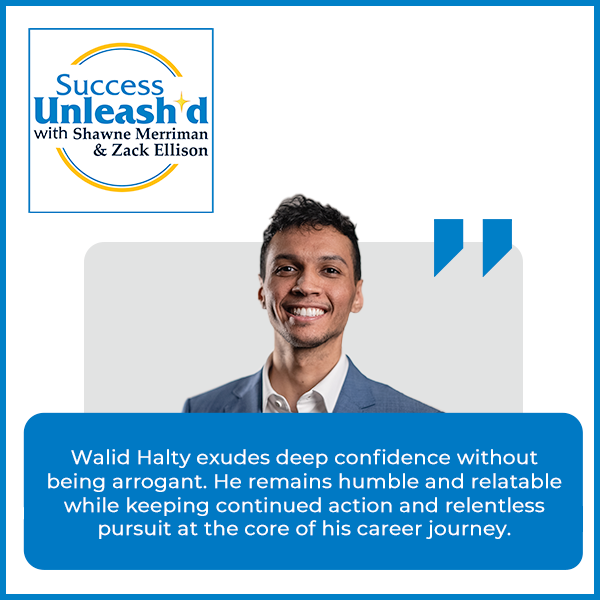
The hardest thing is to get rejected and for people to say no to you. That hurts. If you can develop the thick skin and the muscle to deal with that, you can take whatever life throws at you. It traces way back there. I was a first-generation immigrant from Morocco, the oldest of five. I was like, “I got nothing to lose.” I started door-to-door, and that’s when I started developing thick skin. I made six figures when I was 17 or 18 and then had a failed venture after that. I learned what it’s like to fail and fall flat on your face.
The hardest thing to experience in business is to get rejected. If you can develop a thick skin and muscle to deal with that, you can take whatever life throws at you. Share on XI went to the company Colossus, which was the one before this. We had some stints of success, but we also failed quite miserably during COVID and had to pivot. All of those failures led to the insight that we had about this company, which was, “Wait a minute, why are we doing all this stuff offline? Why isn’t there technology to automate this stuff?” We learned that it’s hard to do, but having the right question to ask in those failures is what led to us saying, “Let’s give it a go. F it. What do we have to lose?” That is how we started bringing together different people that we thought could help, whether it was our CTO, our CMO who scaled a $1 billion company, overseeing the marketing, or different researchers we had on the project. That led to these pieces coming together.
Talk a little bit about what the company does so the audience can understand. Also, I’m very curious how it got its name.
The last company we started was called Da Vinci, like Leonardo Da Vinci. It was also a solar company, more of a marketing agency. We named it Da Vinci because he drew illustrations of harnessing the power of the sun. We wanted to embody the source of how solar started. Monalee was named after the Mona Lisa. We wanted something like a modern twist to it, so we called it Monalee. That’s where it comes from.
The other question is what do we do? Now, in a typical solar company, if you are a consumer and you are interested, it takes you about two weeks to eventually get a price from the solar company. Imagine you wanted to buy a home or a car, and you didn’t get a price for two weeks. Imagine that experience. That’s the experience for a traditional solar company, and because they have to send someone out, get on the roof, inspect it, measure it, what’s the ridge, the edge, the valley of the house, look at the structural elements of the home, look at the electrical elements of the home, and send it to a designer. They build a manual cog design, then they will schedule time to sit with the homeowner and then they will give you the price.
What we have done is be able to partner with different data providers that provide something called photogrammetry data and also LiDar, which is like raw imagery. We then train the imagery with drone data, which is high resolution and super close to the house. Now you can auto-enhance an image with something called image super-resolution. Now the image is super enhanced of what a roof looks like, and then you could add other computer vision and models like edge detection so you can automatically detect the edges of the roof, and then also do something called object detection.
I can detect a chimney, a roof vent, and a dish antenna automatically, and then now I can place panels based on square footage. I can determine shading, and now we have automated it. You don’t have to do a site visit, you don’t need a designer, and you don’t need to need a salesperson. You put in an address and now a consumer can have an accurate design that is ready essentially for someone to go and submit a permit for. That’s how we got our start. We added integrated financing, and we added other modules to the tech stack, but that was how we started cutting out something that’s people-intensive and time-intensive.
How much does that reduce the cost for the buyer of the solar panel?
It’s 46% on average. It’s significant. Two weeks and 46%.
I had a question about this because my philosophy with everything is that I don’t compete. I create. Has there been somebody else in the market who has come up with this idea before you guys? If so, did you look at that and decide to do it better or was it, “Nobody is doing this.” You guys are the first to market to do something like this or do you guys put your touches on it?
It’s been iterative. There was someone who was doing this without accuracy. They would do it and they would give a homeowner a quote, but it was 60% off. What’s the point of that? Imagine you wanted to go buy a house and it was off by 60%, or a car. It creates a horrible customer experience. We saw that like, “Wait a minute. No. You need to build the tech to get it right.” That’s where we got the inspiration and it’s been a little bit like you want to find your blue ocean. This has been our blue ocean white space where we are going to go all in. We believe in it so much. However, almost everybody we talked to was like, “I had this idea too.” It sounded like everyone had their idea of Uber, “I had that idea.” It’s the execution. That matters and so we are executing.
Partnering With The Right People
Now you guys are crushing it and I’m very happy for you and it has been great.
We appreciate your support as well.
It’s been a pleasure being part of you and then watching you guys grow immensely. A big part of it is what you learned from those prior lessons where things didn’t go as well. For the benefit of other business builders and entrepreneurs. Talk about the lessons you learned like what didn’t go right there, why did it fail, and then what did you take away from that that has made Monalee so successful?
I’d say the first one is partnering with the right people. When I first started, I chased a lot of shiny objects because of the resume, the track record, or what looked like a track record. I’m like, “They must be great. I’m going to work with them. I will give up all this equity or I will do this deal without due diligence. You are going to give me $10 million, I will take it, I need it, I want it.”
Those partnerships didn’t work out. I ended up in a lawsuit because the guy on that $10 million deal didn’t end up delivering on their part. It was like a contingency deal performance base, and then I would find out a year later that this company had a track record of not delivering on its promises all because I was young and hungry, but I was chasing the wrong things.
Now, an example here is that we are not taking money from investors unless we truly do our diligence on the partner. Not just say it but like, “Let me talk to other startup founders that I worked with. What happens when they have a bad quarter or two bad quarters? What do they do?” They say, “Go F off. You are on your own.”
My partners right now, co-founders and C-Suite, on resume and paper might not have been the ones I would have hired right away, but because I leaned in, spent time with them, talked to the people they worked with, and took my time, then I got to the core of like, do they value the same things I do? How do they operate? I don’t know what the right way to put it is, but it’s not just chasing the shiny stuff but trying to go deep and truly understand who I’m trying to work with.
I have a perfect analogy for that. You got a guy that’s a first-round draft pick. They’re going to draft him because he’s in the first round, big and strong and all that stuff, but there’s no work ethic. He didn’t have a motor out there. He’s not giving it all. Sometimes that 4th or 5th round guy from Tennessee State that nobody is even paying attention to.
In a way, you almost start partnering with people because of them and not because they say on paper, “This guy is a first-rounder.” I’m taking that 3rd or 4th round guy who is going to give me everything he’s got in that 3rd or 4th round. Not the first-round guy because he’s all the hype and looks good on paper. That’s one of the things I learned myself. I would partner and work with somebody that I see something in, not necessarily like, “That’s the first-rounder. They have a big name. I’m going to go with them.” That’s the shiny object that you’re talking about.
You get the signal. A lot of those times, I got the feeling and signal. I’m like, “They don’t quite fit. They don’t value the same. Maybe they don’t follow through the same way or they don’t work as hard or stay as long or as humble, but their resume is shiny. They have their MBA, they’ve spun off,” but I wasn’t looking for the truth and the depth. Whereas now, I’m looking for that. I’m not looking for a resume. It’s nice. I’m looking like, “Do they embody the things I’m looking for?” That paid dividends because we’ve had no turnover so far. It’s only been a couple of years, but I’m very grateful for our partners now. That’s one thing that is a lesson. It’s going after that instead.
Mentally, when you didn’t succeed in those first couple of endeavors, how did you get through that? It must have been tough mentally, even though it wasn’t necessarily your fault and you learned a ton in hindsight. At the time, I’m sure it was very tough. How did you get through that?
Through a massive continued action. Staying relentless and keep going. I grew up first-generation in government housing, poor. I always had nothing to lose. It was like, “What’s the worst that’s going to happen? Go back to nothing? That’s fine.” It’s continuing to iterate and go and roll with the punches. I saw every one of those failures like, “What’s the lesson here? Got it.” Use it as momentum versus saying, “I’m going to fall on the sword here and surrender.” “No. Let me lean in and use this as momentum.” There are tips and tricks that I have used like reminding myself of my vision, writing my goals, meditating on them, and all that. It was continued action that served me the most.
Success can be achieved through massive continued action and staying relentless. Just keep going. Share on XKeeping The Right Momentum And Relentless Pursuit
I usually get pissed off when I go to these meetings, whether it’s a board meeting or whatever meeting it is, and everybody always tries to bring up football analogies. That used to piss me off because I was like, “I understand. I can speak your language. We’re good.” Whether it’s in tech, intellectual property, or whatever it is. I speak your language but they always make these analogies with football and they pissed me off.
Before you know it, I started to look at some of these conversations and it was so close to football that I started using these analogies. When you say something about momentum, it plays such a big part of everything and a lot of people don’t talk about it. When you have momentum, for me, that’s the time to slam on the gas. When things are going right and you have these opportunities, that’s when you slam on the gas. At what point does momentum for you guys play a big factor?
It’s every day and every week. My goal, I realized as the CEO, is to be the momentum builder and the momentum keeper. If there’s any part of the business that doesn’t have momentum, I have to ask the question “Why not?” and create momentum. Whether it’s spending 1-on-1 time with everybody in the department or doing a quick competition or all-hands or all-intensive or transactional means. We’re all doing something to create that momentum. Once it’s created, keep it on it, get them excited, keep them excited, and keep reminding them what we’re doing, why we’re doing it, what are the wins, and what are we winning here. Got it. These wins are now starting to compound.
The CEO is the momentum builder and momentum keeper in the team. Share on XI’ve realized that my key job as the leader in the organization is to keep that momentum. Thankfully, we have a lot of momentum in a lot of departments now. I used to say, “Okay, cool. I could fall back.” No. It’s like you said, it’s the time to keep it going. It’s always or constant, especially in a high-growth environment. We are at a stage where we are in extreme growth.
You hit on two themes that are so important. One is the word “relentless.” Funny enough, Shawne and I discussed calling this show Relentless Pursuit because that ultimately is how we are wired. That’s how we have been wired our whole lives. We are relentlessly pursuing something more at all times.
It’s a great title. That’s a great one.
The only reason we didn’t do that is it was already taken. Success Unleash’d is a solid title. To me, relentless pursuit is at the core of success, and then that creates momentum. Momentum is so important for startups especially smaller companies. Big companies don’t have much momentum. They don’t need it because they’re huge. They can screw up and not do anything for decades and still survive.
You could argue they’ve created so much momentum. It’s such a big snowball. Eventually, it might catch up to them, but it’s not needed as much as when you’re small like you’re saying.
When you get that momentum, it’s hard to quantify momentum. That’s one of the things that’s always tough when you’re talking to your investors. This is interesting. To go behind the scenes a little bit, Shawne and I have known each other for many years, and we were both building. I think both of us in our separate endeavors were not given the respect that we deserved in many respects because people didn’t know what was going on behind the scenes.
I was fortunate enough to see what Shawne was doing behind the scenes. I saw there was so much momentum. I thought there was no way this wasn’t going to be a huge success. Other people didn’t see it. They didn’t either take the time to look, or they didn’t know where to look, or they weren’t given the opportunity to look.
I knew, based on how much momentum there was and there is right now, that what he’s doing with Lights Out Xtreme Fighting will be a huge success because of that momentum. To use a football analogy, you have a 275-pound lineman coming at you with 4-5 speed at full speed. You’re not going to stop him. If you are the fullback, you are getting run over. That’s how I feel about momentum and you harnessing that.
That’s a great point. We are going to throw all the football analogies because they are so relevant.
Plans On Further Building And Growth
It’s funny. A lot of people don’t realize, Shawne played basketball in high school and I did as well. We’re both very good. One of the things I want to do in the future is have a 3-on-3 charity tournament. I’m thinking that with Shawne and I and two other guys that are equally as big and athletic, I don’t think anybody could score on them. I’m thinking we may get like Metta Artest and Kenyon Martin, I can still stick the jumper. I don’t know, Shawne. What do you think? Who should we get on our team?
Probably Kenyon for sure. It’s funny you say this now because we’re looking back on a lot of this stuff. We talked about momentum several months ago. This has changed in the last several months. Walid, one thing I wanted to ask you about is what you guys are doing right now. Everybody has goals. You have these goals and aspirations. You set where you guys want to go at what point you want to be, at what point in the year, and all that. This industry is massive. I know about the door-knocking and solar. I worked with SolarCity in the past. I used to have appearances for those guys. I used to go to their campus.
I know how big this industry is, but you guys have created something that I like to call a hub. That’s what I did with Lights Out Sports TV. I created a hub for all sports. You got wrestling and motocross. You created a hub where people have to come. In a sense, you created a hub for all these places, whether it’s SolarCity or whoever it is. You created a hub that people have to come to in a massive industry. How far do you guys plan on taking this?
There’s a lot of work to be done. We could be talking in twenty years, and we’ll still be scratching the surface. With energy demand and with AI right now, that’s going to 10X the demand for alternative energy. Solar is the lowest levelized cost of energy. If we’re talking ten years, Monalee should be a publicly traded company that’s employing thousands of people, that’s servicing thousands of installers, and helping tens and hundreds of thousands of consumers.” Even then I would tell you, we are still getting started. There’s a lot of work.
If I wasn’t doing this like you love to ball, you love to play sports, and now you love to build businesses. If I sold this business for $100 billion, the thing I’m going to do tomorrow is like, “What’s the next problem?” I have to go build again just like an artist loves to paint. We can go for a long. At some points, there might be opportunities where we have investors who are expecting a return, but there’s a lot of work to be done.
When you guys have your big exit, I want you to come partner with me at ARI, and we’ll fund the next generation of game-changing innovation. That’s the way I think about it.
Let’s do it. I always think about what helped me and it’s the things that helped you, the things that you want to help others with, or the ones that you can relate to. Having capital providers and people who invested in us, at some point, I want a return that and invest in early-stage founders.
The Power Of Showing Up
In terms of what you’ve learned, what’s the best advice that you’ve received? Not just lessons learned, but people that have taught you that you could pass down to others.
The best advice I’ve ever received that I could pass on to others, I’d say the best one is that 80% of success is showing up.
80% of success is just showing up. Share on XIt’s 100% fact.
You just show up. Keep showing up. Some days you show up a little better than others or more prepared than others. The opportunity, the right people, and all that will meet you.
I use it a lot because, at heart, I’m still like a muscle head. I’m still in the gym six days a week. I still crank the weights. I love training with my fighters and all that other stuff. On certain days, you are not going to feel up to it, but show up and be there. You got to go.
Once you go and you start the first rep or the first set, you forget about the fact that you didn’t feel like going. You’re there. You’re not leaving. I’d say that’s the best one I could give to others. It’s having a tendency towards taking action. That builds a muscle and that muscle is important because there are days you’re not going to feel like it, and that’s when that muscle comes into play.
The Importance Of Lifelong Learning
I wanted to ask you this because somebody asked me the other day what are some of my best qualities. I responded to them, “I don’t see myself as some big smart guy or anything like that, but I’m efficient and I execute.” I get right to it. I’m efficient. I don’t need a whole lot to get things done and I execute once I get there. Those are my two biggest qualities in getting things done. A lot of people procrastinate, and they have a lot of things going on. They’re like an octopus. They have 10,000 things. I’m very efficient. I will get right to the point and I execute when I get there. What are some of your biggest qualities for helping you get to where you are right now?
Do you always have that? Were you always efficient?
Yes. For me, it came from being an athlete. I had to be efficient with my time. We were told from 10 to 11 years old what time to wake up, what time to be at practice, what time to watch a film. If I wanted to get anything done, I might have an hour and fifteen minutes in a day to get as much done as possible. The only way I’ve ever learned is to be efficient.
Most of the people who work at Lights Out are a lot smarter than I am. They have more experience, but one thing that I can do is I can lead a team. I’m very efficient when I get there and I execute. Those are my best qualities out of anything else. I see a lot of people lacking in those areas where they’re not efficient. They get things done, but it costs a lot of money. They take a lot of time or whatever. I’m like, “What is it?” I get right to it. When I get there, I execute and I move on to the next thing. Those are my two biggest qualities. What’s been a big help for you quality-wise?
A couple of things come to mind. One is being a student. I will study. First of all, on my day, I’m looking at my schedule 3 to 9 times, “What am I doing? Is this the most efficient? Am I prepared for this? How can I prepare for this?” Some days I’ll have 20 or 15 meetings, maybe low end, it’ll be 10 meetings. Being a student of my calendar, but also like, “Let me do research on this. Let me ask for help.” Yes, I’ve got a little bit of an ego and I’ve accomplished some success, but I’m constantly looking for information and studying. Being in that beginner’s mind serves me. As you said, a tendency towards action. I work Saturdays and Sundays. I am lights out, all out, all the time. Pun intended.
When we talk about a tendency towards action, I don’t care if I have no information. I’m going to go and do it and try to figure it out. Those are probably two that come to mind, and then I’m always trying to find great people. I’m sliding in everybody’s DMs on LinkedIn. If I find someone great, I’m in their DM, “You are exactly who I want to partner with. Let’s chat?” I message thousands of people a year. Every single person on my C-Suite team was DM-ed by me at some point. I’m limited but if I can find great people and be able to inspire them and get them aligned with the same vision, we can accomplish a lot. That’s the third one if I had one.
This theme of being efficient comes from the need to survive when you grow up without money or you are a founder and you have to be efficient to survive. I grew up with no money and a single mom. To me, necessity is the mother of invention. Necessity, for me at least, and probably for you guys too, from what I know about both of you, necessity is what caused you to operate like that. You had to do that to be successful. That’s what’s interesting about being a founder. It’s very different from going to a job at a bigger company where you can be smart, you can be hardworking, but your job and your livelihood are not on the line. It is when you are a founder.
You are not forced to be resourceful and creative. When you are forced to be resourceful and creative, you somehow find a way.
When you are forced to be resourceful and creative, somehow you find a way. Share on XIt’s this idea of lifelong learning that you talked about. Shawne and I are both the same way. Everybody we talk to, we are learning from them. Every one of these episodes that we are doing, I feel like it’s a great education for me. Even if nobody in the world ever tuned in, it would still be very beneficial because I get to talk to people like you and learn from you.
People will often ask me like, “Why do you have so many degrees or credentials?” The honest-to-God truth is I grew up with no money. When I was younger, I said, “I’m going to take down every credential there is because I’m never going to be poor again.” I don’t want to have to prove to somebody that I’m smart. I don’t want to have to go in and give them the long version of why they should believe in me. I want to go, “Look at my resume. Look at where I started. If you can’t make a decision based on that, I don’t want to do business with you anyway.”
It’s pretty important. This is for my sake. I got a certificate here from Harvard Business School for a couple of accounting classes I took. I didn’t have to do it. No one told me to go do it, but I’m like, “I am dealing with a lot of smart investors. I’m telling our head of finance all this stuff to do. I want to be great at this. I want to be able to speak the same language.” In the same way, I have taken some computer science classes because I want to understand all the stuff our technical team is doing. It has helped me a lot.
Building Confidence And Managing Ego
If you were to give your younger self advice or your eighteen-year-old self, what would your older self tell your younger self?
When I was a kid or teenager, I struggled with self-confidence because I was a super skinny nerd, top in my class, but I didn’t go to the gym and workout. I didn’t date girls or any of that stuff. Not until college, where I overdid it. I overcompensated in college. I would tell myself, “That confidence is going to come from me working on myself.” As I do now, I can remind myself, “As you are doing right now, work on yourself, go to the gym, study, and find the things that you are curious about.” That’s what I struggled with in my teens. That’s where the confidence is going to come from. Now I have this insurmountable confidence, and it comes from the constant beating on my craft every single day, working on myself. I would give myself that sneak peek. Work on yourself. That’s how you get confidence.
I love that you have deep confidence, but you are not arrogant. You are humble, but you know what you are good at and you can get stuff done. I always look very closely at founders and their egos, and how they are managing it because I want a big ego. I want people who believe they can accomplish anything, but I want them to be humble at the same time. It’s hard to do both but I feel like you’ve that in good form.
It’s where the source of the confidence comes from. Is it superficial that they are overcompensating for something or is it coming from truth, experience, belief, and faith? That’s different. Shawne, are you going to say something?
You said something that looped us in about being able to ask questions. Even though being a founder, being the CEO, and having the ability to say, “I don’t know,” or ask questions or get information. A lot of people overlook that because they feel that you are in a position where you are the owner, you are the CEO, you have built something massive, you built something very sustainable, or something that has a lot of growth to it, but you don’t know everything. They have the ability to ask questions.
That’s one of the things on this side as far as the capital raise or anybody we talk to. I got questions all the time because I never did that before. Now, can I grow an MMA league? Yes. Can I launch a streaming service? Yes. Can I get these deals done with venues and casinos and all of that? Yes, because I got experience doing that, but you come into something else where you almost have to be humble enough to say, “I don’t know.” That has helped me out big time where you level yourself back down again to not be afraid to ask those questions.
When you are humble like that, you are not afraid to ask questions, and say, “I’m good at some things, but I’m not experienced in this, or maybe I’m not great at it.” Some people are more inclined to help when you come at it from that perspective. Let’s use a sports analogy. We use that a bunch, but when there’s a younger player and they are like, “Tell me what I need to do to get to the next level. I will put in the work. I don’t know yet. You’ve done it. Teach me,” that attitude resonates with a lot of people.
For someone who came in, they are super cocky, full of themselves, “I’m good at all these things,” you are not inclined to help them. Whereas someone came in and was confident like, “This is where I’m struggling. You are great. Give me some help.” You will be super inclined to help them. Even if you had very little time, you’d want to help them.
If someone is cocky and full of themselves, you would find it hard to help them. Share on XFinding Life’s Beauty Through Meditation
Have there been people in your life on the business side or personal side that have been rocks for you, that have helped you get over the hump and get through the tough times?
There’s one in particular. I’ll give him a shout-out. His name is Kevin over at a company called Dreamfuel. I have been working with him for years. He’s a visualization coach and neuroscientist as well. We work on meditation stuff, visualization stuff, thinking about the future, and then tools to help with times of stress and all that. He’s been with me through a lot and we have visualized almost everything that I have accomplished. He’s been very helpful. I was always a student of this stuff, but he was someone that I found helpful. There’s another guy, Joe Dispenza. I don’t know if you’ve heard of him. I have been to 12 or 13 of his meditation retreats, like week-long meditation.
That helped me slow down, but speed up in the sense that I am not going 100 miles an hour. I can go a little slower but see four steps in advance because I’m not just, “Go, go, go.” That’s my inclination. I am operating from a more meditative place. I meditate every single day. Those two have been helpful because those are parts of me that I lacked. I have always been, “I don’t care. I’m going to make up for it with work and brute force.” This helped me make up for it or even me out a little bit where I can sit back, reflect, and go a little bit slower on some things.
I tried the meditation thing for me and I found it a lot more fun to punch some people in the face in the gym.
I tried it for a while. It took me six months because I couldn’t get it. I’m like you, high D, always doing, always going. It took me six months. This was eight years ago and I was going through a tough time. I said, “I need something to get me out of this rut that I’m in.” For some reason, I’m thinking this meditation thing might get me. I did a whole week-long retreat of meditating for 40 hours, and then I finally got to this a-ha moment where I’m like, “Got it. This is what they are talking about.” It took so long for me to experience it and I didn’t want any other feeling after that. I hear you, Shawne.
I will get there one day. You’ll hear from me that day when I get there.
It’s not for everyone, but I will look forward to it.
A-ha. I got it. I’m there.
Episode Wrap-up And Closing Words
This has been great. I appreciate you coming on and looking forward to staying in contact with a lot of stuff. I think that what you guys have done already, but more importantly, what you are going to do is groundbreaking. For me personally, I can’t wait to see how far you guys take it.
Thank you, Shawne. This was a pleasure. Zack, thanks for coordinating this as well.
Likewise. You are onto something and you have the right mindset and work ethic to take you to the finish line. I’m rooting for you. I think you are going to crush it.
I appreciate it, and let me know if that 3-on-3 comes to fruition. I want courtside tickets, please.
Speaking of which, you should come out to one of the Lights Out Xtreme Fighting events. I know you couldn’t make the last one, but they are awesome to see it up close. You won’t want to miss it.
When are they usually, and where are they usually hosted?
Every 4 to 6 weeks, we normally have a show, typically in SoCal. I’m going to do a 3 or 4 fight deal with a casino in Miami. We’ll be in Texas, Arizona. I’m getting my license in all those states now, so it should be good.
It’s on the Lights Out website? I can go check and you have the schedule on there.
Lights Out Sports. We are on every smart TV, TV device, iOS, and Android, and then we normally announce the fights about 7 to 8 weeks out.
I’m a huge sports fan and fighting fan, so I watch UFC and boxing every chance I can get. Let’s do it.
You’ll love this. We got a hell of a crowd. I look forward to having you out.
What are the ounces on the gloves?
It’s 4 to 6 ounces. Pretty straight knuckles.
The fights keep getting better and better. The last event was ridiculously good. Every fight was action-packed, and the production quality was great. I couldn’t stay till the very end, and so we were watching it on the drive back on our smartphones, and it was crystal clear. I was thinking that this production quality is equal to or better than anything you’d see.
That’s what you need for the Jake Paul fight. They should have reached out to you guys.
Everybody reached out to me after that fight and told me I should take over their production and what they were doing. I said, “Netflix got the money, so they can pretty much pay me to do whatever they need.”
I appreciate it. Thanks for the time.
I appreciate it. Thanks.
Thanks, Walid.
Important Links
- Zack Ellison on LinkedIn
- Zack Ellison on Instagram
- The 7 in 7 Show with Zack Ellison (podcast)
- Applied Real Intelligence (A.R.I.) website
- Shawne Merriman on LinkedIn
- Shawne Merriman on Instagram
- Lights Out Sports TV website
- Lights Out Xtreme Fighting website
- Walid Halty on LinkedIn
- Colossus
- Monalee
- Dreamfuel
- Lights Out Brand
- Walid Halty’s Email Address
About Walid Halty
 Walid started his career in energy technology at Tesla, where he was one of their leading solar managers. He then founded Colossus.com (acquired by PX.com), a leading solar marketplace. He recently founded Monalee.co in 2022 with the conviction to leverage the latest methods in computer vision, AI, and design to remove the friction consumers and installers face when buying & installing solar. His work is featured on TIME Magazine, and NPR Planet Money. He is also a part-time coach at Dreamfuel.com helping other founders with mental performance using neuroscience-based methods.
Walid started his career in energy technology at Tesla, where he was one of their leading solar managers. He then founded Colossus.com (acquired by PX.com), a leading solar marketplace. He recently founded Monalee.co in 2022 with the conviction to leverage the latest methods in computer vision, AI, and design to remove the friction consumers and installers face when buying & installing solar. His work is featured on TIME Magazine, and NPR Planet Money. He is also a part-time coach at Dreamfuel.com helping other founders with mental performance using neuroscience-based methods.
Walid Halty, walid@monalee.co 781-558-7018
